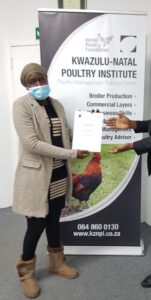This story is one in a series from Frances Chisholm highlighting stories of lives impacted by World Poultry Foundation programs and workshops both in the U.S. and abroad. We encourage you to learn more about Ms. Chisholm and our poultry projects in South Africa.

Asked about the best part of the recent Hatchery Management course that she attended at South Africa’s KwaZulu-Natal Poultry Institute, Fortunate Shivambu demurred, “Everything is imperative, everything is linked. You have to understand the whole process.”
The young Hatchery operator, with a degree in Animal Production, a focus on Animal Nutrition, and experience in poultry breeding, recounted many things she learned during the five-day course sponsored by the World Poultry Foundation. After the anatomy lesson, for example, “We performed egg break-out on eggs that failed to hatch to determine the stage at which the chick had died, then we checked the hatchery records for parameters like temperature and humidity on that day. The correct temperature and humidity play a big role in the hatching rate,” she explained.
Fortunate also saw how damaged eggs won’t produce good chicks, and that turning the incubator every hour keeps the embryos from sticking to the shell. The biosecurity focus was also an eye-opener, “Proper use of disinfectants is very important and beneficial to the entire hatchery operation process.”
On the egg supply side, Fortunate learned the importance of breeder age, nutrition, and the date of egg collection and storage time, “You need to have a trustworthy supplier.”
The young Agri-Preneur, who is the Director of Pholopheto Enterprise (Pty) Ltd, is currently running five incubators. She’ll be approaching her 20,000 egg capacity soon. She enjoys advising her buyers on the care of their chicks. “It’s a sellers’ market,” she says, but the cost of a backup generator, necessitated by frequent power outages, weighs on her operating costs.
Looking at the bigger picture, Fortunate summarizes, “It’s like running a hospital maternity ward. One has to be very strict – no compromises, if I want a good hatching rate. I monitor my eggs at every step of the process.”
The maternity ward analogy came easily to Fortunate. She gave birth to a healthy baby boy only a month before attending the hatchery course.
“My sponsors have been absolutely great,” she says of WIBC, South Africa’s Urban Agriculture Initiative which funded her business concept, supported by Jobs Fund, a unit at National Treasury, the World Poultry Foundation, and the South African Poultry Association (SAPA). She also showered her husband and siblings with an appreciation for their support and motivation.
Looking to her future, Fortunate spoke of the need to engage in action-based learning, “Remove the “L” from LEARNING to start EARNING as an Agri-Preneur. I believe I can do it.”
Well put, Fortunate, good luck to you!

Ms. Frances Chisholm
Friend & Supporter of the WPF
Learn More About Frances
CATEGORY
LOCATION